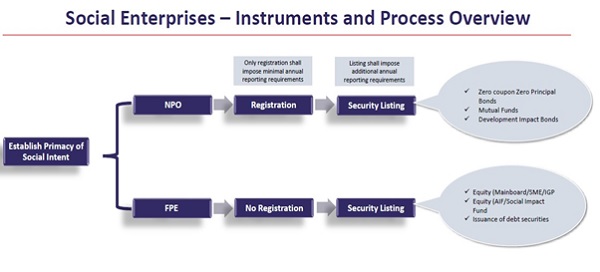SOCIAL STOCK EXCHANGE
A Social Stock Exchange (SSE) is a platform or marketplace where social enterprises and organizations that generate positive social and environmental impact can raise capital through the issuance of securities. Its purpose is to connect investors interested in supporting socially responsible initiatives with these impact-focused organizations. The SSE provides a regulated and transparent marketplace for investors to buy and sell securities issued by social enterprises, facilitating the flow of capital towards businesses and projects with a social or environmental purpose. The SSE typically operates with a dual objective of achieving financial return and measurable social impact.
In the Budget Speech for FY 2019-20, the honorable Finance Minister, Smt. Nirmala Sitharaman, proposed the idea of an electronic fundraising platform called the “Social Stock Exchange.” This platform would operate under the regulatory oversight of SEBI, enabling the listing of social enterprises and voluntary organizations working towards achieving social welfare objectives. They would have the opportunity to raise capital through equity, debt, or units similar to a mutual fund.
Objectives of the Social Stock Exchange:
- Regulated platform that brings together social enterprises and donors
- Facilitate funding and growth of social enterprises
- Enabling mechanism to ensure robust standards of social impact and financial reporting
Page Contents
About Social Stock Exchange
The Social Stock Exchange segment on the NSE offers a distinctive opportunity for Social Enterprises, including Non-profit Organizations (NPOs) and For-profit Enterprises (FPEs), engaged in eligible activities to register and raise funds on a recognized exchange platform.
A Social Enterprise, which can be a Not-for-Profit Organization (NPO) or a For-Profit Social Enterprise (FPE), must fulfill the eligibility conditions as specified in the SEBI ICDR Regulations or as determined by SEBI periodically. Such enterprises meeting the specified criteria will be allowed to register or list their instruments on the platform.

Eligibility Criteria
A. Predominance (Any one of the following)
- At least 67% of the immediately preceding 3-year average of revenues comes from providing eligible activities to members of the target population
or
- At least 67% of the immediately preceding 3-year average of expenditures has been incurred for providing eligible activities to members of the target population
or
- Members of the target population to whom the eligible activities have been provided constitute at least 67% of the immediately preceding 3-year average of the total customer base/beneficiaries
B. List of eligible activities for demonstrating primacy of Social Impact
- eradicating hunger, poverty, malnutrition and inequality
- promoting health care including mental healthcare, sanitation and making available safe drinking water
- promoting education, employability and livelihoods
- promoting gender equality, empowerment of women and LGBTQIA+ communities
- ensuring environmental sustainability, addressing climate change including mitigation and adaptation, forest and wildlife conservation
- protection of national heritage, art and culture
- training to promote rural sports, nationally recognized sports, Paralympic sports and Olympic sports supporting incubators of Social Enterprises
- supporting incubators of Social Enterprises
- supporting other platforms that strengthen the non-profit ecosystem in fundraising and capacity building
- promoting livelihoods for rural and urban poor including enhancing income of small and marginal farmers and workers in the non-farm sector
- slum area development, affordable housing and other interventions to build sustainable and resilient cities
- disaster management, including relief, rehabilitation and reconstruction activities
- promotion of financial inclusion
- facilitating access to land and property assets for disadvantaged communities
- bridging the digital divide in internet and mobile phone access, addressing issues of misinformation and data protection
- promoting welfare of migrants and displaced persons
- any other area as identified by the Board or Government of India from time to time
C. Target Segment
Social Enterprise shall target underserved or less privileged population segments or regions recording lower performance in the development priorities of central or state governments
Entities Excluded
- Corporate foundations
- Political or religious organizations or activities
- Professional or trade associations
- Infrastructure, and housing companies, except affordable housing
Benefits of Registration/Listing
- Improved market access– An SSE will facilitate a common and a structured meeting ground between Social Enterprises and investors/donors with inbuilt regulation for providing sanctity and accountability of finances.
- Synergy between investors and investee in social aims– In view of flexibility of investments and capital that would be available on an SSE, the canvas of choice would be much wider allowing investors and investees with similar missions and visions to connect seamlessly
- Performance based philanthropy– Performance of the enterprises listed on an SSE would be monitored thus it will instill a culture of performance (Social return) driven philanthropy.
- Zero Listing and Admission cost– SSE saves cost for both issuer and investor/donor by charging negligible fees for registration and listing.
- Additional avenue for Social Enterprises– Central and State governments till date have the biggest onus of achieving sustainable development goals. SSE will provide an alternate avenue for raising funds thereby encouraging new and existing social enterprises.
- Enhanced Visibility and Credibility: Listing on an SSE can increase the visibility and credibility of socially and environmentally conscious organizations.
- Increased Impact Measurement and Reporting: SSEs often emphasize impact measurement and reporting as a requirement for listing. This encourages organizations to adopt rigorous impact assessment practices, monitor their social and environmental performance, and report transparently on their outcomes.
- Network and Collaboration Opportunities: SSEs provide a platform for like-minded organizations to connect, collaborate, and share knowledge and resources. This can facilitate partnerships, collaborations, and collective action to address social and environmental challenges more effectively.
- Increased Funding Opportunities: SSE provides a platform for socially and environmentally focused organizations to access capital from impact investors who are specifically interested in supporting businesses with a positive social or environmental impact.
The need for a Social Stock Exchange (SSE) arises from the growing recognition of the importance of incorporating social and environmental considerations into investment decisions.
Here are some reasons why SSEs are needed:
- Addressing Social and Environmental Challenges
- Mobilizing Impact Investment
- Transparency and Accountability
- Market Development
- Mainstreaming Social and Environmental Considerations
- Policy Support
Overall, the need for SSEs stems from the recognition that traditional financial markets often overlook social and environmental considerations. SSEs bridge this gap by providing a specialized platform that aligns financial objectives with social and environmental impact, driving positive change in the investment landscape.
Conclusion
In conclusion, this article highlights the significance of Social Stock Exchanges (SSEs) in promoting impact investing and supporting social enterprises. SSEs provide a platform where investors can connect with businesses that prioritize social and environmental goals, creating a unique marketplace for social impact investments.
The article delves into the eligibility criteria and regulations governing SSEs, emphasizing the importance of transparency and accountability. It also outlines the benefits of SSEs, including increased access to capital for social enterprises, enhanced investor confidence, and the promotion of sustainable development.
Furthermore, the article underscores the necessity of SSEs in addressing societal and environmental challenges, as they offer a mechanism to channel investments toward organizations that make a positive impact. SSEs have the potential to drive sustainable economic growth, create social value, and contribute to the achievement of the United Nations Sustainable Development Goals.
Overall, SSEs act as catalysts for aligning financial resources with social and environmental objectives. By fostering investment in socially responsible businesses, SSEs play a vital role in building a more inclusive, equitable, and sustainable future.





